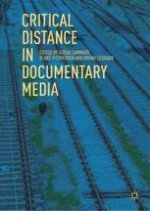2018 | OriginalPaper | Chapter
That Seagull Stole My Camera (and My Shot)!: Overlapping Metaphorical and Physical Distances in the Human-Animal-Camera Triad
Author : Concepción Cortés Zulueta
Published in: Critical Distance in Documentary Media
Publisher: Springer International Publishing
Activate our intelligent search to find suitable subject content or patents.
Select sections of text to find matching patents with Artificial Intelligence. powered by
Select sections of text to find additional relevant content using AI-assisted search. powered by
